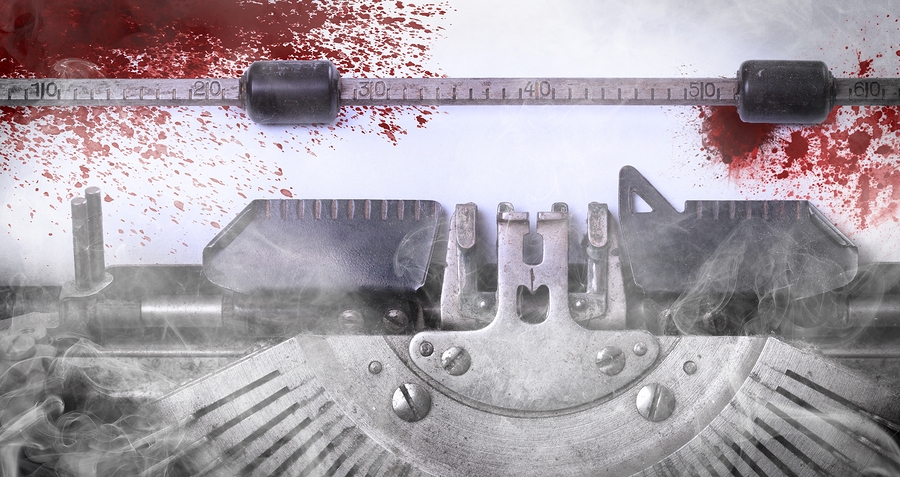
I know I’m not the only author who is listening for the FBI’s knock on the door after googling a search term like,”getting away with murder.”
Authors of crime fiction get that feeling a lot. One of my favorite authors, Karin Slaughter, would probably have no problem with the FBI. All she’d have to do is point them to a shelf of her 20 or so published thrillers — which usually depict the most gruesome killings.
Of course, Slaughter probably also has a team of real life friendly forensic and law enforcement experts whom she can contact for info directly.
The rest of us crime fiction writers, however, rely, to a great extent, on Google. What’s more, the rest of us are also, to varying degrees, paranoid about law enforcement agencies monitoring cyberspace for buzzwords which alert them to crimes about to be committed.
Getting Away With Murder
Which is why I found myself looking over my shoulder again last week when I was making last-minute fact checks on getting away with murder for my latest novel, Fool Her Once (due to be published Spring 2022 by CamCat Books.)
The specific question involved cleaning DNA evidence off a bloody knife. Below is a website page I actually found with information on this very subject:
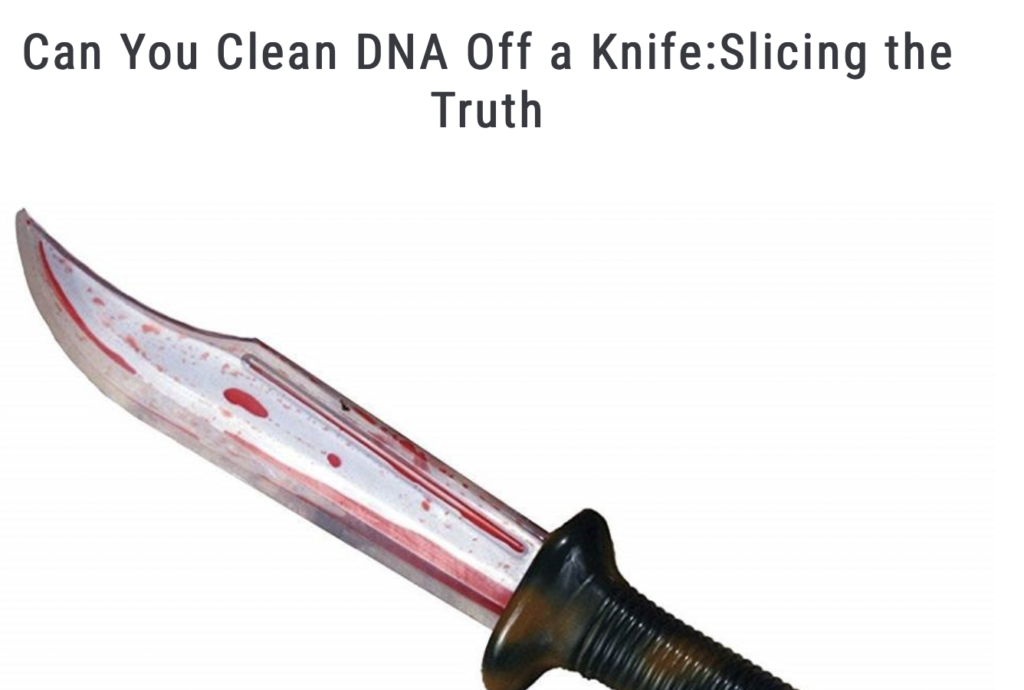
It appears on the website, catchcheatersfast.com. The information is prefaced with this hilarious sentence: “We assume you’re only curious because you want to write a mystery novel.”
Googling Hunting Knives and Skull Fractures
“Of course, officer .” And, that’s also the reason I googled Native American hunting knives so I could study which ones had the longest, most murderous, sharpest blades. Haha!
It’s the easiest task in the world to google a detail you need for a novel. For this latest thriller, I’ve googled how long a body needs to stay in water for evidence of semen to be contaminated if not destroyed. Also, what happens if a skull is fractured because a bad guy kicks your head in.

Also, can one still drown while wearing certain types of flotation devices on boats? Then, there was the time, while writing this current thriller, when I googled : how to tell if you’re a psychopath?
Before Google
It was more difficult to find specific information about getting away with murder when I was writing my first two thrillers in the late 1990s. There were two main sources back then: books and interviews with real-life experts.
As I’ve mentioned in other blog posts, I much prefer interviewing real life experts like the Coast Guardsmen at the Lake Worth Inlet Station in Florida. I spent a morning with them a couple of years ago gathering information for Fool Her Once. I’ve always found that sort of personal research to be a really fun part of writing a novel.
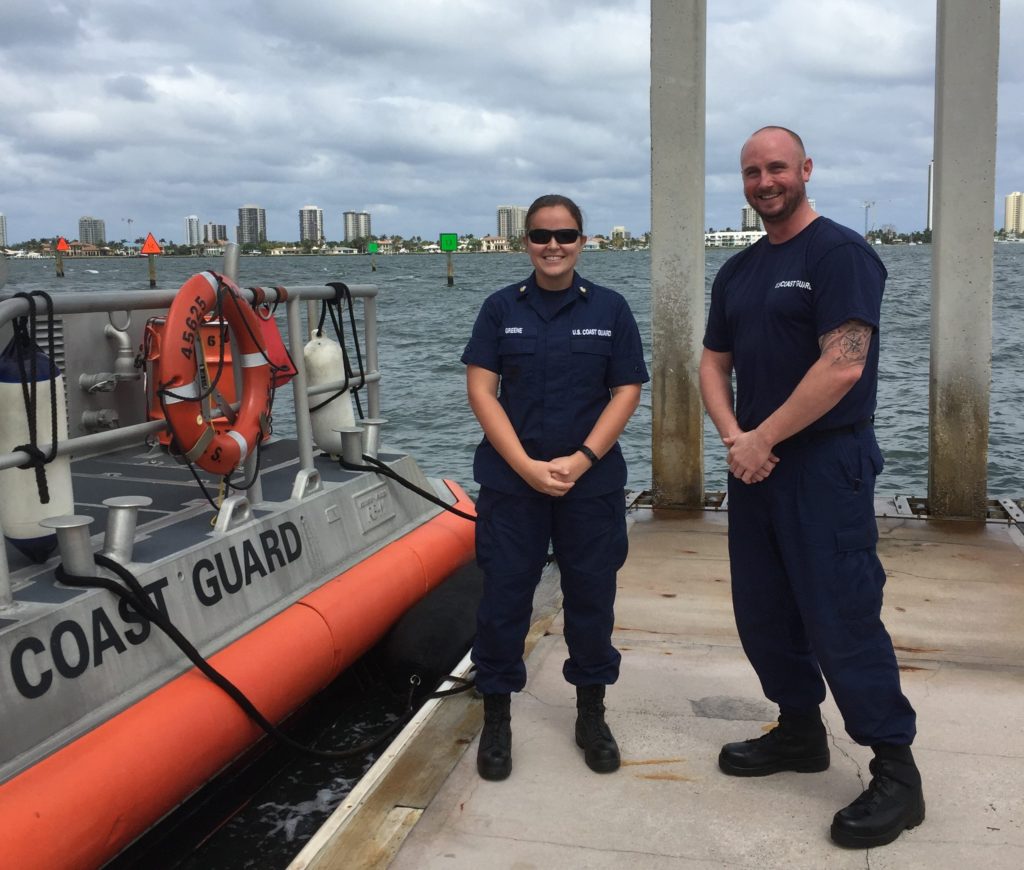 Bestselling author, Joseph Finder (House on Fire) agrees. At a recent Palm Beach Book Festival, he told the audience:”It’s amazing how real life experts will open up to an author when you tell them you’re researching for a work of fiction.”
Bestselling author, Joseph Finder (House on Fire) agrees. At a recent Palm Beach Book Festival, he told the audience:”It’s amazing how real life experts will open up to an author when you tell them you’re researching for a work of fiction.”
Police Procedure
For earlier novels, Scandal and Delusion, I was lucky to have detectives on the Main Line of Philadelphia and in Palm Beach, Florida agree to meet with me to give me factual details about police procedure and how killers can evade the law.
I was recently asked if experts whom I approach for information ever check my credentials as an author. The answer is: I don’t know. But these days, of course, it’s easy because most authors have websites so the information is readily available when you google an author’s name.
Years ago however, I’d visit a police precinct or a medical examiner’s office in person, and explain what information I needed. So long as I wasn’t asking for information about a specific case or person, there always seemed to be someone around who was happy to provide details about their work.
Revealing Autopsies
As for what autopsies can reveal about murder, I conducted my most stomach-churning interview for the book I was writing after Delusion was published. I was fortunate enough to land an interview with Leslie Lukash, the Chief Medical Examiner of Nassau County, Long Island.
 Had Google been a search engine then like it is today, I would have googled Dr. Lukash before the interview and discovered that he’d been the chief medical examiner in Nassau County for decades — and that he was the medical examiner who helped identify the remains of Nazi war criminal, Josef Mengele.
Had Google been a search engine then like it is today, I would have googled Dr. Lukash before the interview and discovered that he’d been the chief medical examiner in Nassau County for decades — and that he was the medical examiner who helped identify the remains of Nazi war criminal, Josef Mengele.
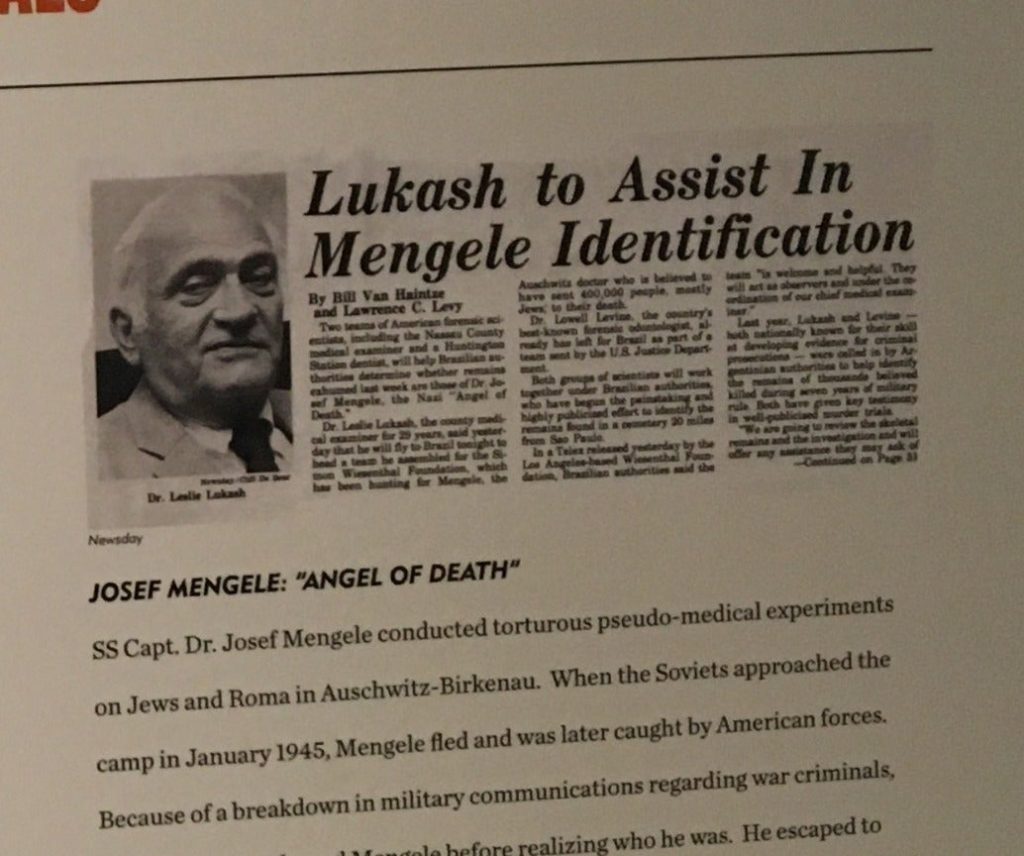
As it was, I was oblivious to his stellar credentials when I met with him at the Nassau County morgue where he personally took me on a tour. I was fascinated, but I stopped short at the doors of the room where an actual autopsy was being conducted.
“C’mon,” he urged me, with a really mischievous glint in his eye, “if you’re going to have an autopsy scene in your book, you have to see one.”
No. No way. I had to draw the line right there. I could not bring myself to walk through those doors. I told him it was quite sufficient if he just described what generally happens in an autopsy.
The Smell of Death
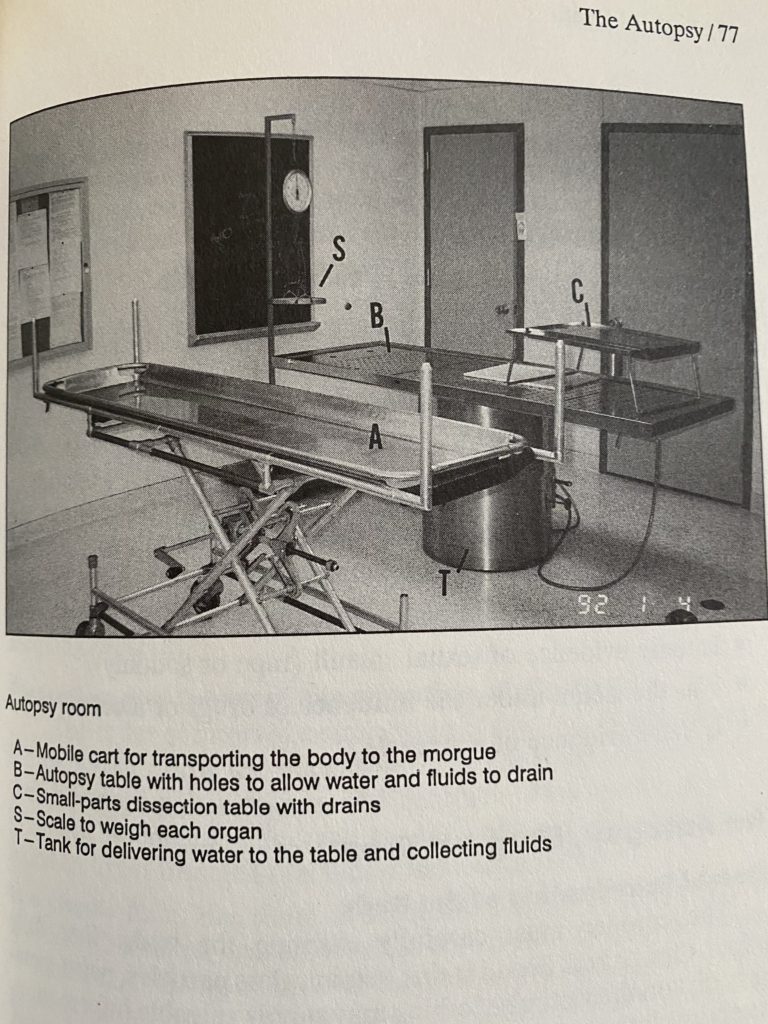
Several years later while attending law school and interning for the Suffolk County District Attorney, I did eventually have to witness an autopsy on a field trip to the offices of that county’s medical examiner.
OK, actually, full disclosure here: I still could not bring myself to look. What I mean by “witness” is, I heard and smelled the autopsy of a person who had drowned and been in the water for several weeks before being found. I don’t know how anyone could ever get used to that smell.
Books On Getting Away With Murder
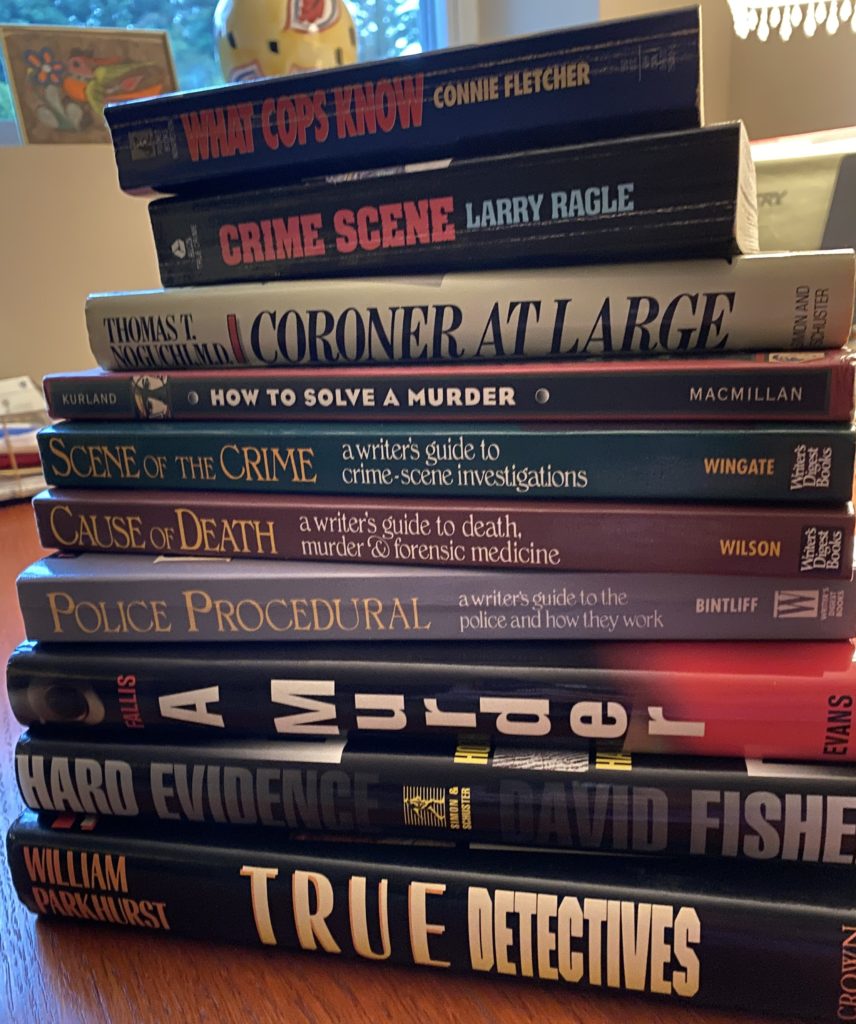
Mostly, in the 90s when I was writing my first two published novels and a third which was never completed for publication, I relied more on books. Books like Cause of Death and Scene of the Crime which were published by Writers Digest Books and contained fairly basic information specifically for authors about death and murder and forensics.
Research for my uncompleted thriller also included a novel. Grand Jury by Philip Friedman was the only book I could find at the time with details of what goes on in a grand jury. Those proceedings are highly secret so it was difficult to find information on the process, but I needed specifics for a scene in that uncompleted novel.
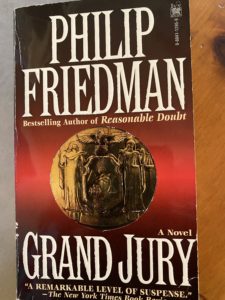 I generally don’t like using information from another novel. You just never know how authentic the details are. In my favorite anecdote about novels that are used for research by other authors, Lawrence Block tells the story of how a typo in one of his novels could have led many spy novelists astray.
I generally don’t like using information from another novel. You just never know how authentic the details are. In my favorite anecdote about novels that are used for research by other authors, Lawrence Block tells the story of how a typo in one of his novels could have led many spy novelists astray.
In Writing the Novel from Plot to Print. Block wrote as follows: “When I read the galleys of Two for Tanner I was startled when a CIA agent in Bangkok pointed out drops and meeting places and fronts — a travel agency, a tobbo shop, a cocktail lounge.
“A tobbo shop? What on earth was a tobbo shop? I checked my manuscript. I’d written “tobacco shop” and a creative linotypist had vastly improved on it.
“I decided a tobbo shop would be the perfect CIA front, adding a cracker-jack bit of local color. So I left it like that. And, now I look forward to the day when I spot in someone else’s fiction a reference to the notorious tobbo shops of Thailand.”
That anecdote has always made me laugh.